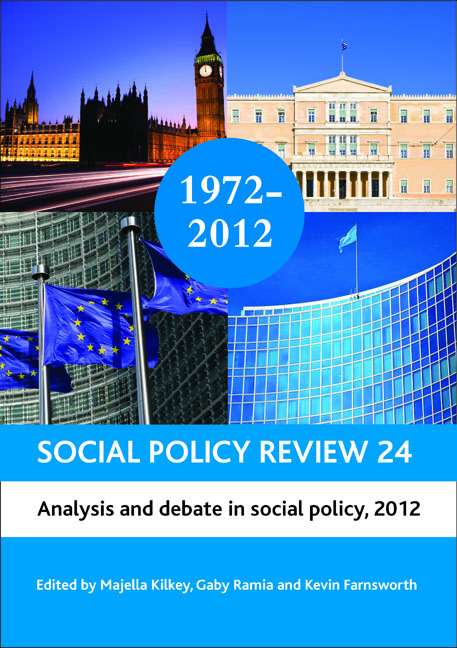eleven - From opportunity to austerity: crisis and social policy in Spain
Published online by Cambridge University Press: 07 September 2022
Summary
Introduction
Despite experiencing more than a decade of rapid growth and achieving a relatively healthy fiscal position, Spain has been hit hard by the financial crisis and is struggling to recover. The collapse of the housing bubble, which largely drove the so-called Spanish Miracle through high levels of corporate and household debt, led to a sharp increase in unemployment rates and put a share of the banking sector under significant strain.
The crisis was seen as an opportunity to implement a change of productive model towards a more productive knowledge-based economy with which to fund the future of the Spanish welfare model. The Spanish government initially reacted with an expansionary programme aiming to reduce unemployment, restore the credit flow and reinforce social protection. These measures, alongside declining public revenues (see Figure 11.1) and increased public spending, led to higher government debt (from 36.2% of Gross Domestic Product [GDP] in 2007 to 60.1% in 2010), but it is still well below the 85.5% average of the EU-17 (Eurostat, 2011a). The weak growth prospects, however, made financial markets wary of Spain's capacity to repay these debts and start demanding increasingly higher yields, while international institutions pressurised the government to introduce austerity measures.
The magnitude of the crisis and the pressures to enact austerity measures forced the government to turn its back on its initial plans. Impetus was then given to a programme of adjustment, deficit reduction and financial stabilisation to ensure medium-term budget sustainability and to placate markets. This is having both direct and indirect negative impacts on the welfare state, as austerity is leading to social spending cuts, and the loss of revenue and growing public deficits are hampering the efforts to develop the limited Spanish welfare state into a much more comprehensive and universalistic model.
The Spanish Miracle and the crisis
Since the late 1990s and until the unfolding of the post-2008 crisis, Spain had experienced a remarkable decade of economic growth, hailed by many as an economic miracle. A booming economy, expanding at a faster pace than the EU average, Spain finally appeared to be catching up with the wealthier Northern European economies (see Figure 11.2).
- Type
- Chapter
- Information
- Social Policy Review 24Analysis and Debate in Social Policy, 2012, pp. 231 - 256Publisher: Bristol University PressPrint publication year: 2012



